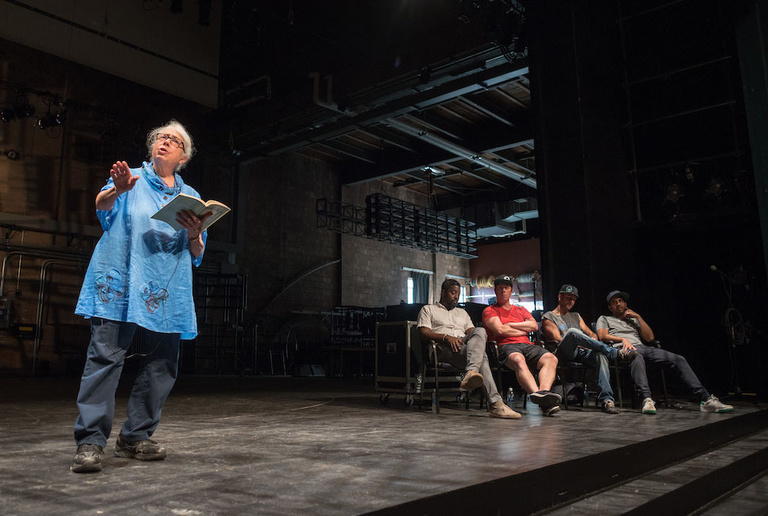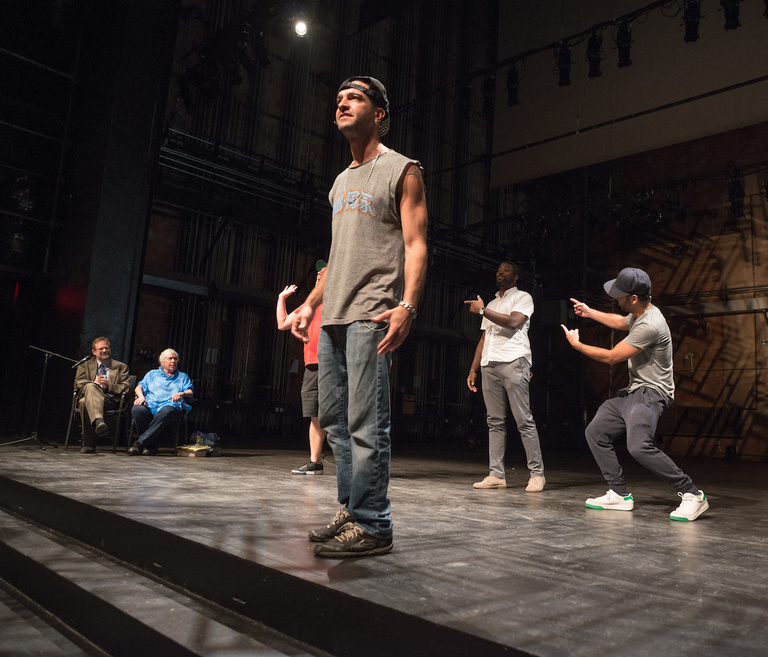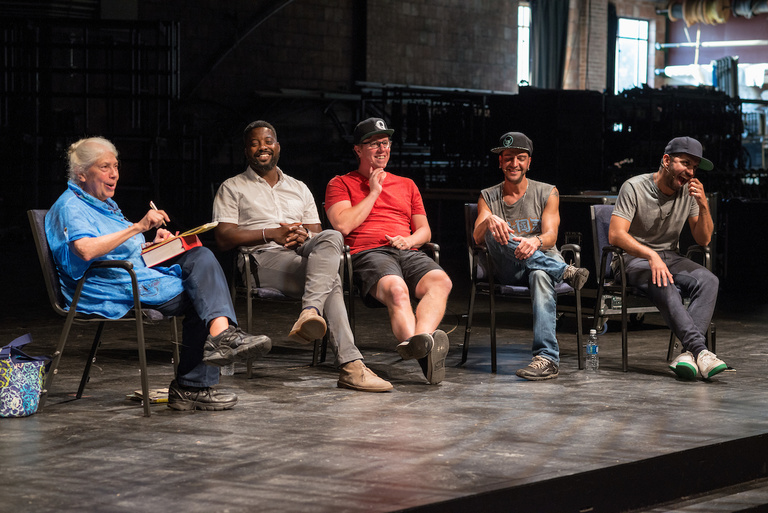“Shakespeare was the hottest verse of his day, and we’re turning him into the hottest verse of our day,” said GQ, founder and creative director of The Q Brothers, at the first Creative Matters lecture on Sept. 20.
The lecture brought together The Q Brothers’ four-member ensemble and UI Emeritus Professor of English Miriam Gilbert for a lively conversation about collaborative creativity, how Shakespeare is possibly best understood today through the medium of hip hop, and how Julius Caesar just wanted to make Rome great again.

“Nicely read, sister,” said GQ, as The Q Brothers ensemble took their positions on the stage. Over a booming hip hop beat, The Q Brothers launched into their interpretation of the same passage from their production of Othello: The Remix – which was commissioned in 2012 by the Globe Theatre in London.
The Q Brothers are currently on campus as UI artists in residence to develop an adaptation of Shakespeare’s Julius Caesar working in collaboration with twelve UI theater students. Their production of Rome Sweet Rome, written by The Q Brothers Collective, runs in performance Sept. 29-Oct. 15 at the David Thayer Theatre, UI Theatre Building. Visit here for ticket information.
When the applause died down, The Q Brothers and Gilbert cozily drew chairs together and began with a obvious question from Gilbert: “How did you get from what I was reading to that? In other words, what’s your process?”
JQ, creative director and musical director of The Q Brothers, said the process starts with a line-by-line translation of what is on the page into modern day vernacular.

They describe how this painstaking process allows them to really delve down into the emotion of each scene. Their interpretation stays true to Shakespeare’s road map of plot points and true to the emotional impact of the original.
Julius Caesar is The Q Brothers’ first experience working with one of Shakespeare’s political plays. Gilbert confessed that she snuck into a rehearsal of Rome Sweet Rome to watch The Q Brothers at work and asked them about the challenges of working with such a rhetorical play.
“I had lunch with one of my professors the other day and she reminded me that making theater is never easy,” said Jackson Doran, a member of The Q Brothers Collective and a graduate of the UI theater arts program. However it’s not as challenging as you might think. “We noticed in Julius Caesar a lot of heightened emotional nationalism that is pretty hilarious in our contemporary context. A lot of man love and super crazy masculinity.”
“And over the top ‘Make Rome great again’…,” GQ added.
“A possible dictator in the future…” said Doran.
“Overreaching foreign policy…” JQ said.
“We are careful to make sure what we are producing isn’t a spoof,” said GQ. “We aren’t Saturday Night Live. We don’t want to be disposable, we want it to be classic.”
One effect of the process of starting with the original text and revising it down to its bones is the play becomes much shorter. The nature of theater productions today doesn’t require constant recapping. Also, some characters don’t make the final cut. This worried Gilbert.

The Q Brothers responded with a collective chorus of “Uuuuuuugh…” not wanting to give away the inclusion or exclusion of the character in Rome Sweet Rome.
“I’d like to put in a plea for Cinna the Poet,” petitioned Gilbert.
While limiting themselves to the roadmap of the original Shakespeare may seem confining, The Q Brothers discussed how “…though limitation comes creativity.” This takes many forms: writing male roles as female roles, telling a story with 20 characters with only four actors, and changing Shakespeare’s iambic pentameter into a 4/4 hip hop beat.
In addition to limitations sparking creativity, The Q Brothers are an active example of collaborative creativity in action. A student in the audience was particularly interested in how this worked for the quartet. The responses ranged from valuing each team member’s contribution, giving him or her space to explore ideas, recognizing that what is created together is so much greater than what can be created alone.
“You have to have a huge level of trust,” said Postell Pringle, The Q Brothers’ creative associate and director of choreography. “You have to trust whatever road these people are leading [you] down. And trust that when they are following your lead, [you need to] trust them then too.”
Given that research and writing are such solitary activities, one could assume that as an academic Gilbert wouldn’t have much experience with the collaborative nature of creativity. When questioned after the lecture, Gilbert explained what drew her to Iowa as a young scholar was the collaborative nature of the campus. Her first five years at Iowa she team taught an English course.
“Teaching is an incredibly creative act and having the conversation with the Q-brothers–talking about the trust and respect that you develop with your collaborators–that is what I experienced,” said Gilbert. “I learned to be who I was in the classroom thanks to that model. It was the greatest gift Iowa gave to me.”
For a full listing of other events in the 2016-17 Creative Matters lecture series, please visit https://creativematters.research.uiowa.edu/.
The Creative Matters lecture series seeks to demonstrate that creativity is not only at the core of all research and discovery, but is also central to our human experience. The lineup of invited speakers includes artists, thinkers, builders, and doers who challenge conventional thinking about creativity, science, and artistic expression, borrowing from a range of influences and disciplines in their work.
The Office of the Vice President for Research and Economic Development provides resources and support to researchers and scholars at the University of Iowa and to businesses across Iowa with the goal of forging new frontiers of discovery and innovation and promoting a culture of creativity that benefits the campus, the state, and the world. More at http://research.uiowa.edu, and on Twitter: @DaretoDiscover.
Photos: (Top) Miriam Gilbert reads from Othello while (L-R) Postell Pringle, Jackson Doran, GQ and JQ look on.
(Middle) Christopher Merrill, director of the UI International Writing Program and event moderator, and Miriam Gilbert observe as The Q Brothers perform a number from Othello: The Remix. (L-R) Jackson Doran, GQ, Postell Pringle and JQ.
(Bottom) Miriam Gilbert with The Q Brothers: (L-R) Jackson Doran, Postell Pringle, GQ and JQ.
Credit: Michael Stenerson